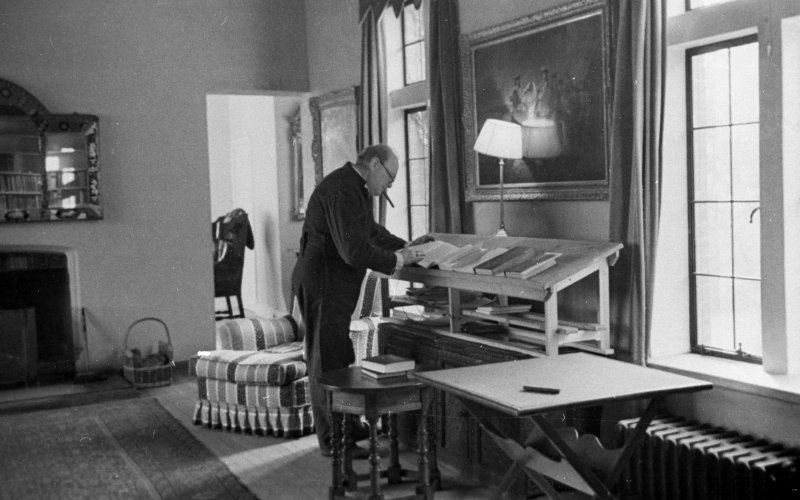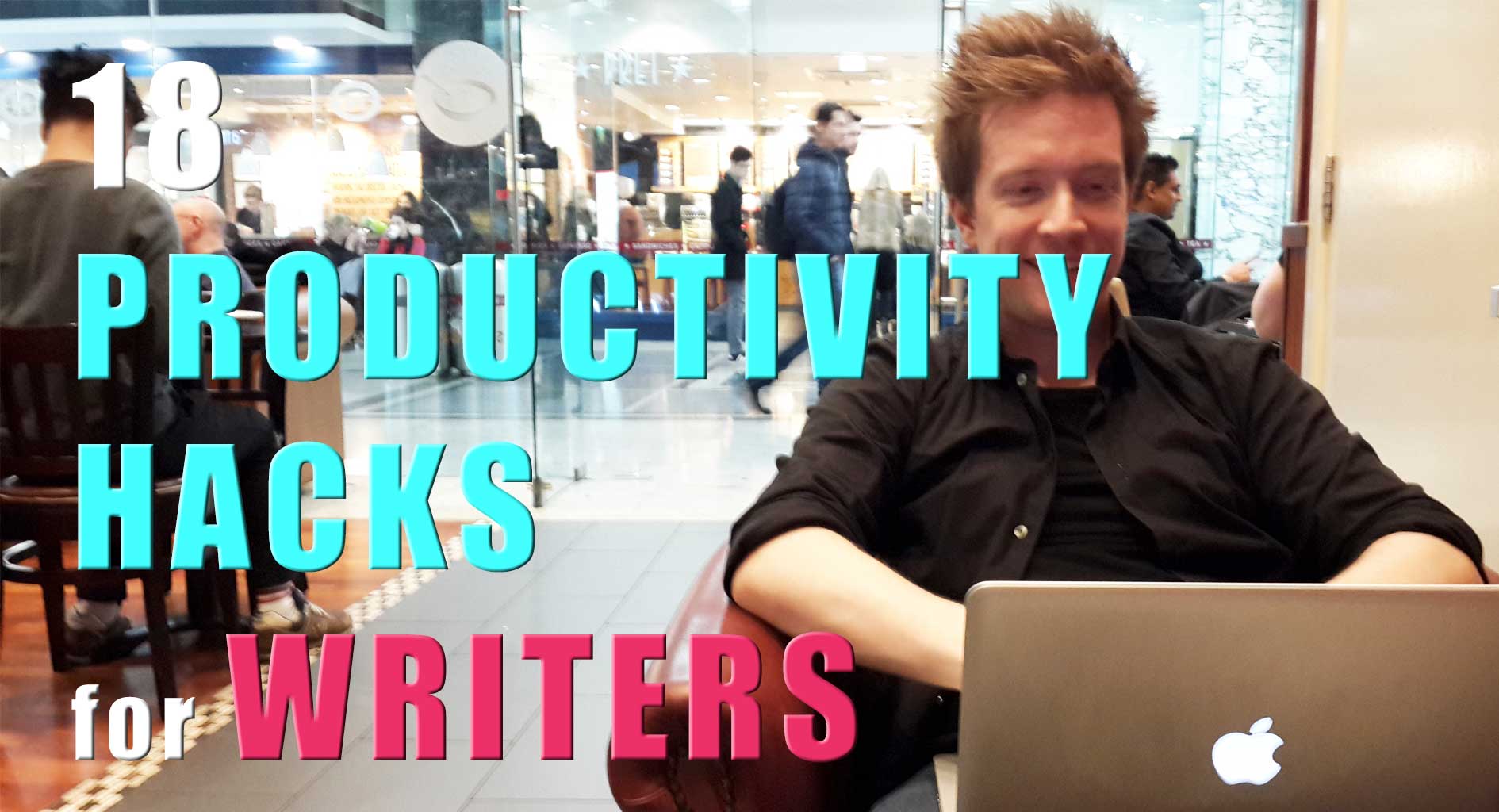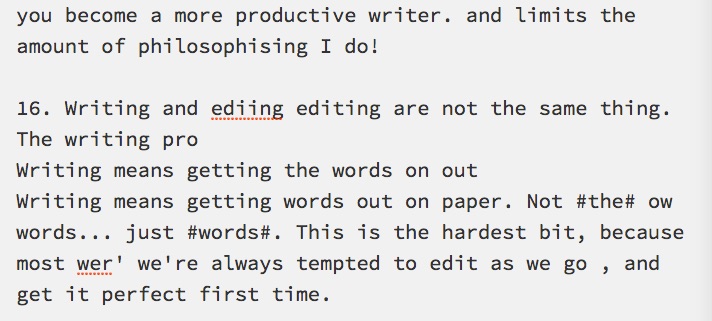
In summer 2013, I started a blog.
Two years later, my dashboard shows 167 published articles.
That's over 1 blog post per week.
During this period, I've worked full-time, lived in three countries, published a book, and completed a master's degree.
So, how did I do it?
How did I carve out the time to write, and keep it up… week after week?
If you struggle to write consistently, this is for you!
Here are the 18 tools, systems and mindset hacks I've used to make writing part of my life.
I've used them to build the blog you're reading right now.
So go ahead, steal these ideas, and get your voice out into the world!
(Sidenote: As anyone who knows me will testify, I'm not a particularly disciplined person. I'm certainly not a born writer. The techniques in this article have helped me succeed at writing against the odds. Just so you know.)
Getting it done
1. Write Every Day
The most powerful thing you can do to become a good writer is to write every day.
It doesn't always matter exactly what you write.
Just that you write.
Writing every day trains you to put words on the page, whatever mood you're in.
It helps to have a daily quota of words. I like to aim for 1,000 words a day, but 500 is fine too.
Whatever your daily quota, what's important is you do it every day.
You'll be amazed how quickly your writing improves, and how much quicker you get after a only a few days!
2. Have A Publishing Schedule
Have a publishing schedule you stick to…no matter what!
For me, it's Sundays.
I publish a new blog post every Sunday.
That's what I do.
It's not up for discussion.
Having a publishing schedule gives your writing structure in a world where no-one does it for you.
Without a schedule, you're at the mercy of other more urgent events in your life. Sooner or later, you'll slip.
With a schedule, you put something out to the world once a week, and one way or another, you will improve.
3. Get The Gear To Write Anywhere
Unless you stay at home all day, you need to be able to write anywhere.
In a cafe, over lunch, on the train.
If you can use dead time for writing, you'll discover untold extra hours in your day. (I used to get a lot of my writing writing done on lunch breaks, and in cafes at the weekend.)
To facilitate this, invest in a portable keyboard for your iPad. This is much more convenient than lugging your laptop around.
With an iPad/Keyboard combo, you've got a writing machine that you can whip out with every spare 5 minutes.
A luxury alternative to this would be a new 12″ Macbook, which are so light and thin they have to be seen to be believed.
But let's not overthink this.
You don't need much.
It's writing.
 4. Distraction-Free Writing Tools
4. Distraction-Free Writing Tools
Use a clean, simple writing tool that lets you focus on the job of writing.
You know how much time you can waste messing around with fonts and layout in Microsoft Word?
Stop it.
Cut it out altogether.
Of the many tools available, my favourite by far is Draft. (I'm using Draft to write this right now.)
Draft's interface is like a traditional typewriter. The lack of distractions makes it dead-easy to focus and get a lot more writing done.
(It's also free.)
5. Sync Between Devices
If you write on the go, you probably want to be able to continue your writing on different devices.
I'll often start a piece of writing in a cafe, and then carry on later at home.
This means you need software that allows you to pick up where you left off, even if you switch from desktop to iPad.
At a basic level, you could use a simple text file and store it in Dropbox, so it's always accessible.
Evernote is a popular choice, but it's not designed for writing and the interface isn't very nice.
However, my favourite option is Draft, because the documents live online and are always in sync, however you access them.
Whatever tool you decide to use, the ability to pick up where you left off (on any device) will transform your efficiency.
Now you can write throughout your day… wherever you are!
6. Stakes
Would you write 1,000 words every day if $5 was on the line?
How about $100?
Damn right, you would! 🙂
But who's gong to going to hold you accountable, and take that $100 from you if you fail?
Enter Beeminder.
Beeminder is a platform that charges you money if you don't complete a certain action.
What's awesome is that it links with Draft, and you can set a minimum word count to reach each day.
I have mine set at 1,000 words, and it bills me $10 if I don't get it done!
This alone has been responsible for 1000s of words you've read on the blog over the last couple of years!
If you hate the thought of losing money, this is guaranteed to work.
7. Leave perfectionism at the door
If you insist on perfection, your work will never see the light of day.
It's not important for your writing to be perfect. It's important for your writing to be read.
So how do you know when to stop tweaking, and hit “publish”?
I try to keep the law of diminishing returns in mind.
That is, I look for the point where more editing does little to increase the quality of the work.
Specifically, that the reader stops benefiting from the changes I'm making.
Whenever I feel I've reached that point, I stop and put it out there.
It's not always easy. But being conscious of my perfectionist tendencies helps to stamp them out.
If you think to yourself: “But everything I write represents me! What if someone sees this and misunderstands me? What if they have a bad experience on my site, or think I've done a half-assed job?”
Here's the truth: No-one cares about your writing.
There are 2.73 million blog posts published every day.
People can't afford to care about what you write.
They only care about one thing: “How can this help me?”
Where you realise this fact, your perfectionism becomes nothing more than a waste of time.
It's your main message that matters.
(Think about it, are you reading this post because you like my writing? Or because you want to be a better writer?)
You mustn't see everything you publish as the gospel truth about you.
Everything you publish is one more step on the journey of learning to write.
Insist on perfection? You'll never release anything or learn the lessons from having published.
Content with “close enough”? You'll produce work that wouldn't otherwise have seen the light of day.
And you'll become a better writer in the process.

8. Write Standing
Get a standing desk.
Or stack some boxes.
It doesn't really matter.
But try writing whilst standing. (It worked for Hemingway, Churchill and Da Vinci and is backed by science.)
The increased energy makes you more alert and keeps you focused, whilst simultaneously making you less likely to waste time on Facebook.
9. Focusing Sound
Get the Relax Melodies app. (iOS, Android)
This does two things:
- Block outside distractions
- Recreate custom sounds and melodies to help you focus
I like the combination of “campfire” + “sea” + “wind”.
The ability to instantly create sound worlds trains you to “get in the zone” on demand, whatever's going on around you.
Capturing Ideas
10. Idea Capturing
You need a system for capturing thoughts, ideas and inspiration.
Why?
An idea is just a dream until you write it down.
As long as an idea remains in your head, only two things can happen:
- You forget the idea
- You get stressed trying to remember the idea, and can't focus on other things until you do something with it
Solve this problem by having one place to record all your ideas.
One place you safely store everything. One place you go to quickly retrieve all your ideas at a later time.
I've already mentioned Evernote, but I use the Evernote widget on my phone to open a new note with one tap.
Systematically recording your ideas reduces the stress of worrying about forgetting.
It clears you mind and allows you to focus on more important things – like writing!
More importantly, it gives you a permanent bank of ideas, so you never have to wait for inspiration to strike!
[Tweet “An idea is just a dream until you write it down.”]
11. Dictate Ideas
Ideas can come to you at the strangest of times.
I often get great ideas when I'm walking or driving, and can't always drop everything and write them down.
Luckily, there's no need to.
I use the voice dictation function on my phone to get my ideas out of head and directly into a note.
Dictation on smartphones used to be inaccurate.
But things have improved greatly, and the basic dictation functionality on your phone is now so good it will accurately produce 90% of what you say.
(Note: you need to speak clearly, but not necessarily slowly.)
Dictating ideas as they come to you helps you stay productive wherever you are.
12. Transcribing
Not every piece of writing has to be original.
You probably generate lots of great ideas through…
- talks
- presentations
- meetings
- brainstorming sessions
- phone or Skype calls
So why not take the work you've already done, and turn it into writing?
How?
Get it transcribed.
Professional transcribers are so quick at what they do, they can be surprisingly affordable!
Once you get the transcription back, the hard work has already been done.
All you have to do is edit.
Getting transcriptions done is an easy way to produce large amounts of quality writing without spending hours doing it yourself.
Here's the service I recommend: Scribie
(Note: If you hate writing, this is one of the best ways to get it done! You speak it, someone else writes it!)
13. Model Great Ideas
Some people say there's no such thing as an original idea.
Whether or not you agree, you shouldn't feel the need to innovate all the time.
All writers learn by imitating others, and the internet's full of amazing ideas you can model. (Note: model, not copy.)
This is a reliable way to quickly produce a solid piece of work when you're not feeling inspired.
Take the concept, title, format etc. of an article you like, and make it your own.
I use Evernote Web Clipper to quickly save it to an “Articles” folder within Evernote.
The key to becoming a good writer: Imitate, Assimilate, Innovate.
Modelling other people's ideas helps you produce great content quickly, by using concepts already proven to work.
“The key to becoming a good writer: Imitate, Assimilate, Innovate.”
Good Writing
14. Plan First, Write Second
Organise your thoughts using mindmaps before you start writing.
Once you've got your main ideas for an article down on paper, then put them in order.
Only then should you start writing.
You should know what you're going to write before you write it.
Not only does organising your ideas in advance make for a more coherent article, but it's difficult to edit the structure of a piece once the words are already on the page.
Organising your ideas before you start allows you to produce good writing in less time.
15. Start At The End
Always start a piece of writing with the final paragraph.
By starting with the final paragraph, you know exactly where you're going to end up.
Having the end in place makes the process of writing everything that comes before much easier.
You focus more.
You digress less.
You take the reader on a better journey.
Think about this article, for example.
With the final paragraph as it is, it keeps me focused on practical applications of the ideas I'm writing about.
Before I hit “publish”, I'll go back an delete any sections which don't offer specific, actionable things you can do to improve your writing.
(How did I do, by the way?)
Starting a piece of writing with the end in mind saves you time by keeping you focused on the outcome throughout.
16. Writing vs Editing
Writing and editing are not the same thing!
- Writing is getting the ideas out of your head and onto paper.
- Editing is making it readable.
You must not edit as you write.
You must write the whole thing first, and edit later.
This is hard.
We're always tempted to edit as we go, and to get it perfect first time.
When you look at any good piece of writing, the greatness is not actually in the writing.
It's in the editing.
Take a look at what this section looked like as I was writing it…
I can't understate the importance of this:
First: You write
Second: You edit
And you should probably spend 3-4 times longer on editing than on writing.
If you lack the discipline to write without editing, yet another reason to use Draft (see #4, #5, #6).
Draft has an amazing feature called Hemingway Mode.
Hemingway Mode removes the ability to move the cursor backwards, use backspace, or otherwise delete anything you've written.
This means all you can do is… write!
You can't edit.
This is incredibly powerful.
“To write is human. To edit is divine. ” Stephen King
Understanding that writing and editing are different things will save you countless hours. It removes the need to get it right first time, and allows you to get on with the job of writing.
[Tweet “”To write is human. To edit is divine.” – Stephen King”]
17. Edit In Stages
Just as writing is not editing… not all editing is the same.
Editing happens in stages.
Don't try to produce a “final edit” in one go.
Instead, edit one piece of writing multiple times, with a different focus on each pass.
I suggest a top-down approach to editing, where you start by focusing on the coherence of the writing…
- Do the ideas covered in the article relate to each other?
- Are your ideas arranged logically within each paragraph?
- …and over the course of the article as a whole?
- Is every point you make relevant?
- Do you address what you set out to answer?
Only once you've done this “big-picture thinking” should you final checks for spelling, grammar, phraseology etc.
Editing in stages ensures you end up with an engaging, readable and robust piece of writing in the shortest possible time.
18. Write As You Talk
When writing online, clear and simple is best.
You're not writing literature, you're writing for people with short attention spans.
So write as you speak.
And keep your sentences short.
Then simplify everything…
- Remove most of your adjectives
- Cut out some adverbs
- Break up your a paragraphs
- Add bullet points
It might shock your high school English teacher, but it will delight your readers.
If you struggle with this, use the Hemingway App to discover what you're doing wrong.
Start to write as you speak and you'll produce clearer, more impactful writing in half the time!
And you thought writing was hard! 🙂
Wrap Up
Time spent writing this post:
- Generating ideas – 15 mins
- Writing – 2 hours
- Editing – 6 hours
- Formatting & publishing – 2 hours
These are the 18 strategies that have helped me become a prolific writer over the last two years.
Each strategy is powerful in its own right.
But you don't have to adopt all of them.
Just pick one and implement it today! You'll immediately start to produce more work in less time.
More importantly, you'll start to put your voice out in the world, and become a better writer in the process.
Are you a writer? Which of these strategies will you implement? Do you have any writing productivity tips of your own? Share them in the comments below!

Olly Richards
Creator of the StoryLearning® Method
Olly Richards is a renowned polyglot and language learning expert with over 15 years of experience teaching millions through his innovative StoryLearning® method. He is the creator of StoryLearning, one of the world's largest language learning blogs with 500,000+ monthly readers.
Olly has authored 30+ language learning books and courses, including the bestselling "Short Stories" series published by Teach Yourself.
When not developing new teaching methods, Richards practices what he preaches—he speaks 8 languages fluently and continues learning new ones through his own methodology.

 4. Distraction-Free Writing Tools
4. Distraction-Free Writing Tools









































